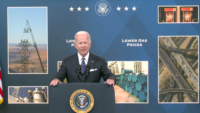One day there will be a book on the ups and downs of state gas taxes and infrastructure finance—with a whole chapter dedicated to what is unfolding during the inflation surge of 2021 and 2022. No matter its good intentions, the so-far limited support for gas tax suspensions today will be seen as foolish political gestures that actually will speed up the damage inflation inflicts by eroding the value and scope of what can be built. Briefly choking off those taxes, which essentially are deposits into a road-and-bridge upgrade savings account, will only make a bad situation worse with negligible benefit to taxpayers.
There are other reasons why gas tax holidays are a bad idea—and why the current interest in them is likely to die. First, not all of the gas tax suspension makes its way into the pockets of drivers. Nothing prevents gas stations from setting prices as they see fit rather than immediately cutting the cost at the pump equal to the tax amount, notes the American Road and Transportation Builders Association. Drivers also may have a hard time perceiving the price drop because they will never know if it was caused by the tax holiday or another oil market gyration.
Initiated by Maryland in 1911, the gas tax spread to all states by 1932. That year, the U.S. Congress, intending to reduce the federal budget deficit, imposed its own one-cent-per-gallon tax for the first time. The late Rep. Don Young (R-Alaska), former House Transportation and Infrastructure Committee Chairman, said in 2003 that he supported indexing the federal gas tax to inflation. At that time, it had not been increased for a decade.
Such taxes have been treated as politically irresistible pushbuttons linked to taxpayer emotions rather than effective tax policy.
Over the decades, such taxes have been treated as politically irresistible pushbuttons linked to taxpayer emotions rather than to effective tax and fiscal policy. In recent months, a Senate gas tax holiday bill initially proposed before the Ukraine war has picked up six cosponsors, but now appears to be stalled. It would suspend the gas tax until Jan. 1, 2023 and excludes diesel fuel. Companion legislation introduced in the House now has cosponsors, but hearings on the two bills have yet to be set.
Only two states have approved gas tax holidays so far. Maryland, whose gas tax is 36.1 cents per gallon, suspended the tax for 30 days starting on March 18. The governor’s office estimates the suspension will cost about $100 million in lost revenue. Georgia recently suspended the state’s 2-cents-per-gallon gas tax for at least two months, and New Jersey, whose 42.4-cents-per-gallon gas tax is fourth highest in the U.S., now is weighing a cutback to the 2016 rate of 14.5 cents for 60 days.
The pain at the pump is real; the inflationary surge is destructive and has no clear end. But roads and bridges don’t magically appear out of nowhere or fix themselves. Taxing the use of fuel, while not ideal, is still the best way to fund the work. The current interest in gas tax cutting will, we hope, soon fade out of the public conversation as the U.S. figures out just what inflation’s impact is on American household finances and on the current historic effort to renew its aging national infrastructure.




